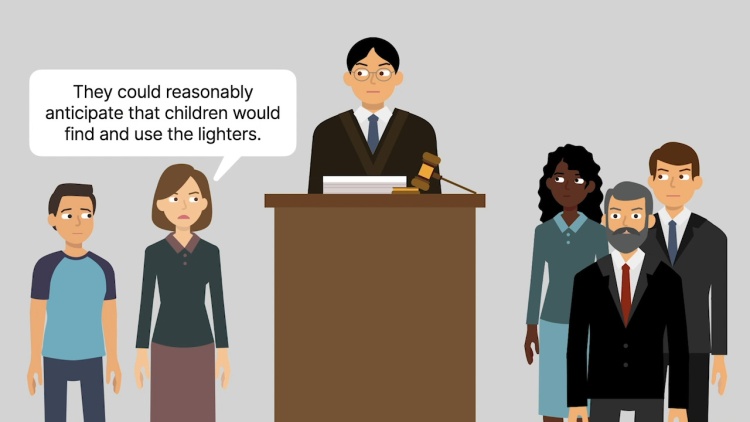Phillips v. Cricket Lighters
Pennsylvania Supreme Court
883 A.2d 439 (2005)
- Written by Samantha Arena, JD
Facts
Jerome Campbell, a two-year-old child, took his mother’s Cricket disposable butane lighter. The lighter did not have any childproof features, and Jerome was able to light the flame, causing a severe fire that killed him and his family. Gwendolyn Phillips (plaintiff), the administratrix of the Campbells’ estate, filed suit against Cricket Lighters and the other manufacturers and distributors of the lighter (Cricket) (defendants), claiming breach of the implied warranty of merchantability and requesting punitive damages. Phillips contended that Cricket should have designed the lighters to be child-resistant. Cricket moved for summary judgment, and the trial court granted the motion, dismissing all claims. Phillips appealed, and the superior court reversed. Cricket appealed to the Supreme Court of Pennsylvania, which reversed and remanded the superior court’s order. Upon remand, the superior court again reversed the trial court’s summary judgment, finding that a reasonable jury could have concluded that the lighter was not merchantable. In making this determination, the superior court stated that the warranty claim was not barred due to Jerome’s status as an unintended user of the lighter, because based on Pennsylvania Consolidated Statutes § 2318, breach-of-warranty protections extended to all members of a buyer’s household. The superior court further concluded that Phillips had offered evidence sufficient to create a genuine issue of material fact as to whether Cricket acted with reckless indifference to others. The Supreme Court of Pennsylvania granted Cricket’s petition for appeal.
Rule of Law
Issue
Holding and Reasoning (Cappy, C.J.)
What to do next…
Here's why 900,000 law students have relied on our case briefs:
- Written by law professors and practitioners, not other law students. 47,000 briefs, keyed to 994 casebooks. Top-notch customer support.
- The right amount of information, includes the facts, issues, rule of law, holding and reasoning, and any concurrences and dissents.
- Access in your classes, works on your mobile and tablet. Massive library of related video lessons and high quality multiple-choice questions.
- Easy to use, uniform format for every case brief. Written in plain English, not in legalese. Our briefs summarize and simplify; they don’t just repeat the court’s language.





